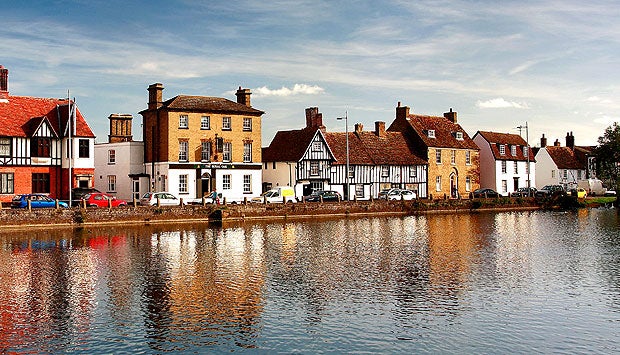New-build property prices rising twice as fast as cost of older homes
Efficiencies drive cost-conscious buyers in the battle against energy and other bills

We’re a nation of old-home lovers, with their airy proportions, period features and downright kerb appeal. But now, as the cost of living crisis hits, are we turning our back on historical homes?
Higher building and construction costs, soaring demand, and lower energy bills are just some of the reasons new-build homes are rising at a much faster rate than existing properties.
The cost of a new-build home shot up 25.4 per cent annually, to £367,219 in November 2021, according to the latest data from the Land Registry which is based on actual home sales. This is compared to an annual rise of 8.6 per cent to £264,684 for existing homes.
The housing market has seen sustained growth since the start of the pandemic, largely because of an imbalance between supply and demand.
But the data appears to show that new-build homes are storming ahead of existing properties when it comes to price.
This is despite the fact these homes have experienced their fair share of controversy in recent years. Millions of homeowners were trapped in leasehold contracts with expensive ground rents that made their properties unsellable, for example, while many were also covered in unsafe fire cladding which meant the value of the properties plummeted.
It would appear there are a few different explanations as to the price differences between new and older homes but in both cases, the pandemic and the lack of supply are the driving factors for rising prices.
David Fell, senior analyst for Hamptons estate agents, says: “The pandemic has changed buyer preferences and developers have responded by delivering larger numbers of detached and semi-detached homes.
“As more bigger houses are sold, so overall average prices have been pushed up. At the same time, a lack of second-hand stock has meant that buyers have turned to new build and as a result more family homes have been sold off-plan.”
Get a free fractional share worth up to £100.
Capital at risk.
Terms and conditions apply.
ADVERTISEMENT
Get a free fractional share worth up to £100.
Capital at risk.
Terms and conditions apply.
ADVERTISEMENT
The pandemic had a significant impact on the housing market and led to many people reassessing where they live and work.
Millions of workers now have a home office, for example, and no longer need to commute into a city centre. Many new builds have been designed with this in mind, and homeowners can often customise the design and finishings, so when they move in there’s not much else to do.
Chris Gardner, joint chief executive officer of the development lender Atelier, says: “New builds are emerging as big winners in the post-lockdown property market – for the simple reason that they are the most likely to offer exactly what buyers want.
“The past two years have made people think long and hard about what they want from a home, and the most astute developers have responded by adjusting their designs accordingly.
“We’ve financed several developments of a dozen or so homes that are perfectly tailored to what buyers want in that area, and which also boast ultra-energy-efficient designs and sustainable construction techniques.”
There are many advantages to a new build-property, which is also why they are more expensive. They come with lower maintenance costs and these homes are generally far more energy efficient which means gas and electricity bills are also lower.
Energy bills are a huge topic right and two new measures have been announced by the government to lower costs. VAT for materials needed for energy-efficient measures, such as insulation and solar panels, was cut to 0 per cent in the spring statement and a £5,000 grant scheme for those replacing an old boiler with a heat pump was launched last week, yet costs remain high.
In fact, 45 per cent of homeowners have looked into making their property more energy efficient but have found the costs too expensive without government support, according to new research from tax advisers Cornerstone Tax.
The price of construction materials has also played a big part in rising costs. The cost of building materials is at a record high, while supply issues have also had a knock-on effect on the price of new builds.
Eve McCurrich, managing director of Whiteburn Projects Ltd, a new-build construction company, says: "New-build housing inherently is a higher price comparative to existing housing stock. This is due to a combination of factors.
“Recently, the costs associated with construction and development have seen unprecedented inflation due to short supply following Covid, Brexit and now wider geopolitical uncertainty in Europe with the invasion of Ukraine.”
The availability of mortgages for new builds is another reason for the rise. The help-to-buy loan scheme, which is only available for new build homes, will end next March, so buyers could be trying to take advantage of this before the deadline.
Some experts have also suggested that mortgage providers are more willing to lend to those buying new-build homes because they are seen as less risky than older homes.
New builds, for example, typically come with a new home warranty which should cover the homeowner if anything goes wrong. The most common is the National House-Building Council (NHBC) which cover 70 to 80 per cent of the market, according to the Home Owners Alliance.
David Hannah, group chairman of Cornerstone Tax, says: “Most mortgage lenders prefer to lend on new-build stock because it comes with NHBC guarantees and I have heard of first-time buyers being turned down for mortgages on second-hand homes but then accepted for a more expensive new-build one.”
“The reasons for this are probably that the mortgage lenders regard these as lower risk.”
Join our commenting forum
Join thought-provoking conversations, follow other Independent readers and see their replies
Comments
Bookmark popover
Removed from bookmarks